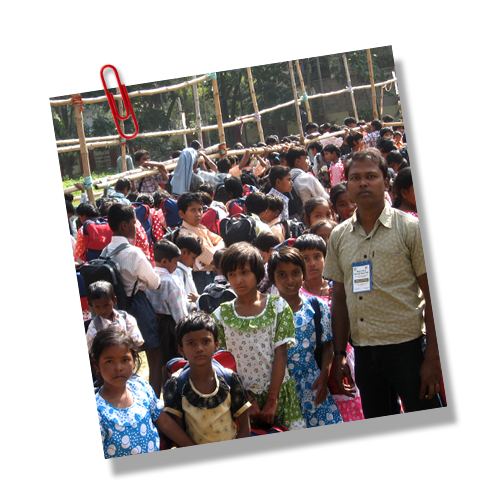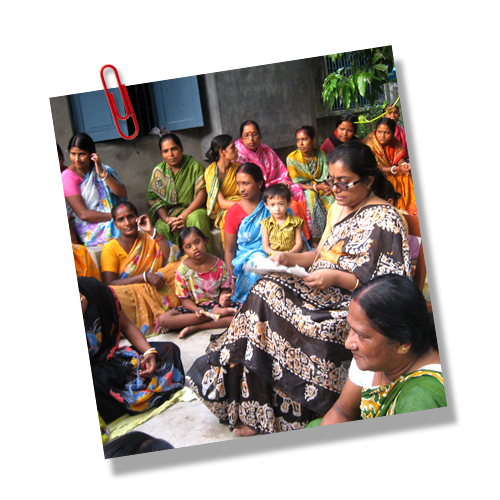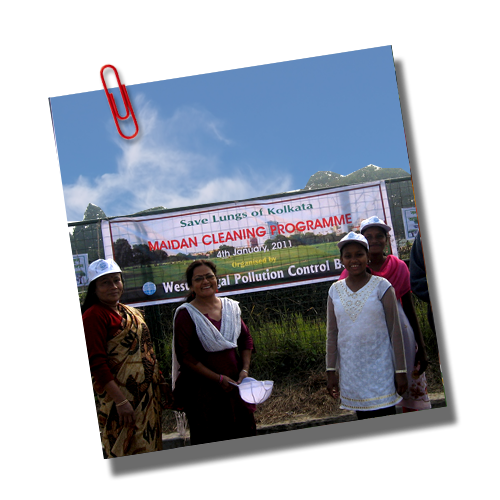

The Let’s Code Project, initiated by Change Initiatives in collaboration with Capgemini, is a commendable endeavor aimed at empowering young minds in 10 government-sponsored schools within the Sonarpur circle. This project targets students ranging from class VI to IX, offering them a unique opportunity to delve into the world of basic computer programming and coding languages such as Scratch and Python.
One of the standout features of the Let’s Code Project is the establishment of dedicated coding labs in each of the participating schools. These labs are equipped with state-of-the-art resources, including computers, projectors, 3D printers, and a range of tinkering items. Such an environment fosters an immersive learning experience and allows students to explore the realms of technology, creativity, and problem-solving. The schools have allotted the class in their existing routine which has helped to run regular training session smoothly.
With over 5100 students enrolled in this initiative, its impact is widespread and profound. By introducing project-based learning, the Let’s Code Project not only equips students with valuable technical skills but also nurtures their critical thinking and problem-solving abilities. This approach transcends traditional rote learning methods, enabling students to apply their knowledge in practical scenarios.
Moreover, the project promotes computational thinking—a fundamental skill in today’s technology-driven world. It encourages students to think algorithmically, breaking down complex problems into manageable steps. This skill is invaluable in various aspects of life, from academics to professional pursuits.
The project is also up scaled to the Madhyamgram area as at Khelaghar, a computer lab is also set up with computers, projector, printer and TLM items.
The basic aim is to spread STEM education among the underprivileged students and development of scientific mind and problem solving skill among them

Under the banner of Kisholoy Project, Change Initiatives, in partnership of Barabazar PS, is making a significant impact on the lives of marginalized communities in Purulia. Here Change Initiatives adopted 5 Sabar Bikash Kendras which were founded by famous Bengali Writer Mahasweta Devi, providing essential elementary education to the children of the Sabar tribe. The Sabar Bikash Kendras mainly locate at five remote villages of Purulia named Beldih,Garasagma, Jahanabaid, Jilling Bhalukdih and Latpada which are under the supervision of Barabazar PS.
One of the standout features of this initiative is the provision of daily tiffins to these children, ensuring that they have the energy and nutrition needed to focus on their studies. This not only addresses immediate nutritional needs but also encourages regular attendance and active participation in their education. The students mainly learn mathematics, science, Bengali, yoga at the school. The kids also celebrate the special occasions like Saraswati Puja, Independence Day, etc.
Change Initiatives goes a step further by supporting tribal children with scholarships, clothing, blankets, and books. These provisions are more than material assistance; they represent a lifeline to a better future. Education is not just about classroom learning; it's about breaking the cycle of poverty and empowering these children to dream big.
With over 200 Sabar children enrolled across the 5 Sabar schools, the impact is profound. It's not just about education; it's about fostering hope and opportunities for a brighter tomorrow among a historically marginalized community.
Change Initiatives also extends their compassion to a slum school at Panchanantala. Every Saturday, we provide education and tiffins to the students of the school.

The Nabanna initiative of Change Initiatives, empowers women through skill development, entrepreneurshipand awareness-raising.
Our goal is to broaden women's mental horizons by implementing initiatives related to livelihoods, health, the environment and gender rights. We seek to influence attitudes and change behaviour through mentoring, focused information dissemination and link-ups with service providers.
Nabanna started as a programme to improve access to women in ICT tools so that the women can empower themselves by directly accessing digital information. The scope of the programme has been considerably enhanced to direct income generation from ICT-based businesses to skill building in areas such as tailoring and paper-bag generation.
We have provided digital literacy training to over 1000 women. Empowering them with essential digital skills not only enhances their employability but also promotes their active participation in the digital age.
We worked with 100 self-help groups (SHGs), involving over 1,000 women in Chhtomollakhali and Kumirmari Gram Panchayets for mangrove plantations. These dedicated individuals are actively nurturing and safeguarding the mangroves, playing a vital role in preserving this critical ecosystem. Apart from the mangrove plantation in Chotomollakhali, we want to ensure their better livelihood through an animal husbandry project. Our goal is to give them complete training on poultry, duck, and goat farming and marketing that would lead to proper capacity building and the complete sustainability of the project.
We've also worked with 140 self-help groups (SHGs), comprising over 1,000 women in Saguna Gram Panchayat, West Bengal, notably in Kantabele and Madandanga villages. Our involvement extends to managing their accounts and facilitating informative sessions on various government schemes, healthand gender-related matters. This collaboration empowers these women with financial literacy and knowledge, fostering holistic community development.
We've have worked with district resource persons, cluster representatives and the dedicated members of self-help groups (SHGs) across three districts – 24 Parganas North, 24 Parganas South and Howrah. Our focus has been on empowering these communities with valuable skills, offering training in computer literacy and equipping them with ICT tools for awareness programs.
In addition, we've nurtured a remarkable initiative called Digital Graphics within the Bishnupur Gram Panchayat, situated in South 24 Parganas, Bengal. where we've provided training in computer basics to 1,000 women as part of a UNESCO project. Moreover, we've actively worked with another 200 women, guiding them in establishing micro-enterprises.
These efforts underscore our commitment to fostering digital empowerment and economic self-sufficiency among women in these regions.

Plant Mangroves, Rebuilt Sunderbans: In recent years, the Sundarbans Forest, one of the world's most critical natural ecosystems, has faced significant degradation due to both manmade activities and the devastating impact of several cyclones. Recognizing the urgency of the situation, we embarked on a mission to restore this invaluable treasure by planting 300,000 mangroves across the Chhotomollakhali and Kumirmari Gram Panchayats.
To ensure the success of our endeavor, we launched extensive awareness campaigns aimed at instilling a sense of responsibility among local communities for the newly planted saplings. Education and engagement have been instrumental in fostering a deeper understanding of the importance of the Sundarbans and the need for their protection.
For effective field-level implementation, we have actively involved local Self-Help Groups (SHGs).More than thousand SHGs women work alongside with us These grassroots people have played a pivotal role in nurturing and safeguarding the newly planted mangroves. Their deep-rooted connections within the community have proven invaluable in our mission.
Our commitment to the Sundarbans continues to grow, as does our hope for a restored and thriving ecosystem. Together with local communities and dedicated SHGs, we are working tirelessly to ensure the Sundarbans remain a symbol of ecological resilience and sustainability. Join us in this vital cause to protect our planet's precious natural heritage. Supported By:Schneider Electric India Foundation, Tellus Carbon
Mission Million Trees: We planted 17,000 saplings were planted across multiple locations in West Bengal, Assam, Rajasthan, and Gurugram as part of an initiative to promote carbon neutrality cricket match. The endeavor aimed to offset carbon emissions associated with the event. The diverse geographical spread of these plantations underscores the commitment to environmental sustainability. This green initiative not only contributes to carbon reduction but also supports local ecosystems and enhances the overall green cover in these regions. It serves as a commendable step towards aligning sports events with environmental responsibility, setting a positive example for future endeavors.
As part of the Mission Million Tree Programme, we have successfully planted 60,000 saplings, demonstrating our commitment to combat deforestation and safeguard the environment. Our efforts extended to various regions in west Bengal, including Jhargram, Nadia, Hooghly, Purulia, Bankura districts, the Sundarbans, and New Town area. Each sapling has been meticulously geo-tagged on Google Maps, ensuring transparency and accountability throughout the project. Supported By: Schneider Electric,International Association for Human Values, WWF, Capgemini. .
Project Well: Providing clean water and sanitation to rural areas poses a pressing challenge. Keeping in mind the 6th sustainable development goal of 'Clean Water and Sanitation', the Change Initiatives Project Well has made a great impact on rural communities and the environment over the years. Preventing arsenic contamination of groundwater with indigenous technology Setting up and maintaining bacteria-free, arsenic-free bi-tech wells with iron-removal filters.At present, there are 166 bi-tech wells for "Arsenic Mukto PanioJawl" in 5 blocks (Baduria, Deganga, Habra, Swarupnagar, and Gaighata) of the North-24 Parganas and one block (Chakdaha) of Nadia, West Bengal, India. As many as 2,500 families and 10,000 consumers use the well on a monthly basis. The project upgrades old dug-wells into modern bore dug-wells (bi-tech wells) that tap water from the upper arsenic-free aquifier Collaborator: Proejct Well,US
Solar Energy promotion among children villages. Distributing solar lamps among the children of Madandanga and Kantabele villages in Nadia district. Solar lamps can be charged during the day and used for studies in the evenings.
Workshops on disaster management and earthquake at state-government schools in Calcutta. Anti-plastic workshops among SHGs in West Bengal.
Smart Enterprise: Recycle saris into carrybags, a direct campaign against plastic carry bags. We invite donations of old saris, which are turned into bags that can be folded and kept inside smaller bags and pockets. Already more than 1,000 bags have been sold in the market in a month.
Member of Sabuj Mancha network of NGOs